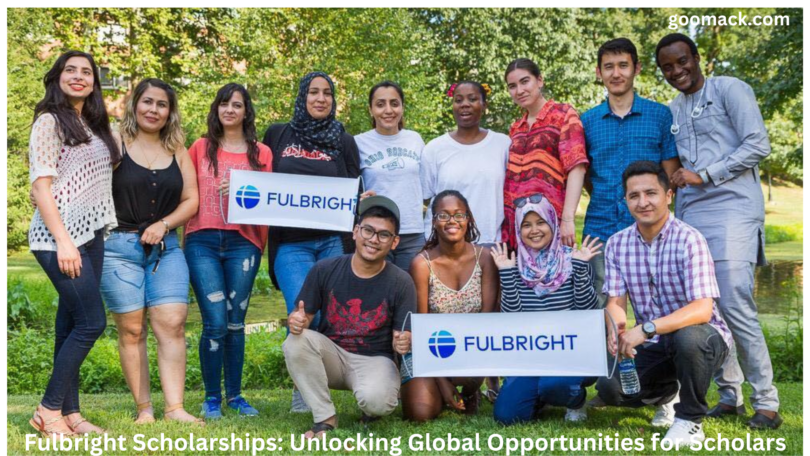The Fulbright Scholarship is a prestigious international exchange program that provides unparalleled opportunities for students, researchers, and professionals to study, teach, and conduct research in the United States. With a focus on fostering cross-cultural understanding, this program has enabled thousands of individuals from around the world to broaden their academic and professional horizons. This biography delves into the rich history, application process, and benefits of the Fulbright Program, while highlighting its significance for international scholars.
The Origins of the Fulbright Scholarship
The Fulbright Program was established in 1946 by Senator J. William Fulbright with the goal of fostering mutual understanding between nations through educational and cultural exchange. The scholarship aimed to promote peace and diplomacy in the aftermath of World War II. Today, it remains one of the most prestigious and competitive academic programs globally.
ALSO SEE: Fully Funded International Scholarships for 2024: A Comprehensive Guide
The program initially started with U.S. citizens traveling abroad but quickly expanded to include foreign students and scholars visiting the United States. The creation of this initiative stemmed from Fulbright’s belief that global conflicts could be mitigated through understanding and collaboration across borders. By investing in education, the program has since opened countless doors for students and professionals alike, enabling them to experience diverse cultures and contribute to global knowledge.
Eligibility Criteria for the Fulbright Scholarship
To be eligible for a Fulbright Scholarship, applicants must meet specific requirements that vary depending on the country of application. Generally, candidates need to possess a bachelor’s degree or higher, though some categories also allow students pursuing postgraduate degrees. In most cases, a demonstrated commitment to academic excellence and leadership is crucial.
For international students looking to study in the United States, the Fulbright Foreign Student Program is the ideal gateway. The program seeks individuals who display exceptional promise in their fields and exhibit potential for leadership and academic achievement. Applicants are also expected to provide strong letters of recommendation and a well-crafted personal statement outlining their goals and ambitions. These components of the application serve to paint a picture of the candidate’s academic and professional journey, while emphasizing their contribution to intercultural exchange.
Application Process for Fulbright Scholarships
The Fulbright application process is thorough and highly competitive, requiring candidates to prepare extensively. The first step involves identifying the specific program you wish to apply for, as there are several options tailored to various academic levels and fields of study. Applicants must submit a detailed research or study proposal outlining their academic goals, a personal statement, and recommendation letters.
Most countries have their own Fulbright Commissions or U.S. embassies that manage the selection process. It typically involves multiple stages, including written applications and interviews. The application process is a rigorous one, designed to select candidates who will not only excel academically but also contribute to fostering cross-cultural understanding and diplomatic relations.
Benefits of Receiving a Fulbright Scholarship
One of the primary benefits of the Fulbright Scholarship is the financial support it provides, which covers tuition, living expenses, travel costs, and health insurance. Additionally, scholars gain access to a robust network of alumni and professional development opportunities that continue to support them long after they complete their studies.
Recipients of the scholarship also benefit from the prestige associated with being a Fulbright Scholar, which can enhance their academic and professional reputation globally. The program fosters a sense of global citizenship and provides scholars with the chance to immerse themselves in the culture of their host country. This deep cultural exchange often results in lifelong friendships and professional connections.
Fulbright Scholarships and Nigerian Students
The Fulbright Program is open to students from over 155 countries, including Nigeria. Nigerian scholars and students are eligible to apply for the Fulbright Foreign Student Program, which enables them to study or conduct research in U.S. institutions. The program has been a crucial platform for Nigerian scholars to pursue advanced research, further their academic careers, and contribute to global knowledge.
Nigerian scholars may also apply for the Fulbright Visiting Scholar Program, which is designed for postdoctoral researchers and professionals. This program allows scholars to conduct research at U.S. institutions, furthering their expertise while building bridges between Nigerian and American academic institutions. Additionally, Nigerian students have the option to apply for the Fulbright Scholar-in-Residence Program, where they can contribute to academic life at U.S. institutions as visiting lecturers or researchers.
Challenges and Opportunities for Fulbright Scholars
Despite the numerous advantages of the Fulbright Scholarship, recipients often face challenges, particularly in adapting to new cultural and academic environments. Living in a foreign country, adjusting to different educational systems, and dealing with the rigors of academic life can be daunting. However, the support system provided by the Fulbright Program, including pre-departure orientations and in-country mentorship, helps scholars navigate these challenges successfully.
Fulbright scholars are encouraged to embrace these opportunities for growth, seeing them as valuable life experiences. By facing and overcoming these challenges, scholars often return to their home countries with a broader perspective, ready to contribute meaningfully to their societies. Many Fulbright alumni go on to become leaders in their fields, using the skills and knowledge gained during their time abroad to drive change and innovation.
Impact of the Fulbright Scholarship on Global Education
The Fulbright Program’s impact on global education cannot be overstated. Since its inception, it has provided more than 370,000 students, scholars, and professionals with the opportunity to expand their academic and professional horizons. The program has played a vital role in promoting cultural diplomacy and fostering international collaboration in research and education.
Through its vast network of alumni, the Fulbright Program continues to influence global education, with many former scholars holding prominent positions in academia, government, and business. These individuals often advocate for educational exchanges and collaboration, furthering the program’s mission of promoting mutual understanding between nations.
The Role of Fulbright Alumni in Advancing International Relations
Fulbright alumni form a global network of individuals who have contributed significantly to advancing international relations and cultural understanding. Many alumni have gone on to hold leadership roles in various sectors, including government, education, and non-governmental organizations. Their experiences as Fulbright scholars often shape their approach to diplomacy, fostering a commitment to international cooperation and cultural exchange.
This alumni network serves as a valuable resource for current Fulbright scholars, providing mentorship and professional development opportunities. It also helps maintain the program’s legacy by continuing to promote its core values of peace, understanding, and collaboration across borders.
Conclusion
The Fulbright Scholarship is more than just a financial grant; it is a transformative experience that fosters personal and academic growth, promotes cross-cultural understanding, and strengthens international relations. For those fortunate enough to be selected, the Fulbright Program offers unparalleled opportunities to explore new cultures, pursue academic excellence, and contribute to global diplomacy.
FAQs About Fulbright Scholarships
1. What is the Fulbright Scholarship? The Fulbright Scholarship is an international exchange program that provides grants for students, researchers, and professionals to study, teach, and conduct research abroad.
2. Who is eligible for the Fulbright Scholarship? Eligibility varies by country, but generally, applicants must hold a bachelor’s degree and demonstrate academic excellence and leadership potential.
3. How competitive is the Fulbright Scholarship? The Fulbright Program is highly competitive, with a rigorous application process. Successful candidates typically have strong academic records and compelling personal statements.
4. What are the benefits of the Fulbright Scholarship? Benefits include financial support for tuition, living expenses, travel, and health insurance, as well as access to a global alumni network.
5. How can Nigerian students apply for the Fulbright Scholarship? Nigerian students can apply through the U.S. embassy or Fulbright Commissions in Nigeria. The application process involves submitting a study or research proposal, letters of recommendation, and undergoing an interview






